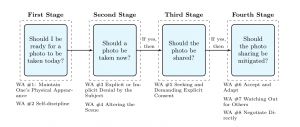Pervasive photography and the sharing of photos on social media pose a significant challenge to undergraduates’ ability to manage their privacy. Drawing from an interview-based study, we find undergraduates feel a heightened state of being surveilled by their peers and rely on innovative workarounds – negotiating the terms and ways in which they will and will not be recorded by technology-wielding others – to address these challenges. We present our findings through an experience model of the life span of a photo, including an analysis of college students’ workarounds to deal with the technological challenges they encounter as they manage potential threats to privacy at each of our proposed four stages. We further propose a set of design directions that address our users’ current workarounds at each stage. We argue for a holistic perspective on privacy management that considers workarounds across all these stages. In particular, designs for privacy need to more equitably distribute the technical power of determining what happens with and to a photo among all the stakeholders of the photo, including subjects and bystanders, rather than the photographer alone.
Read more in our SOUPS 2018 paper.


